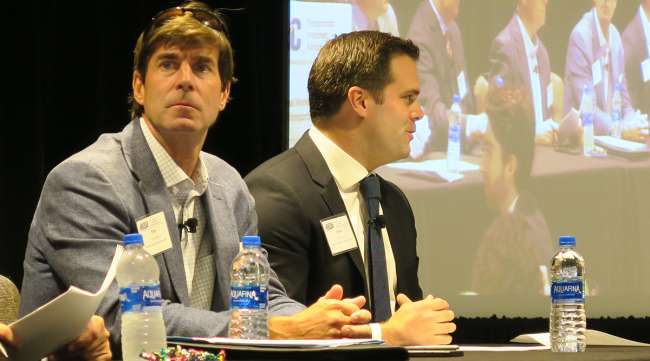Staff Reporter
Transportation Investment Bills Can Succeed With Officials’ Support, Experts Say

[Stay on top of transportation news: Get TTNews in your inbox.]
WASHINGTON — Support from state and local officials is vital for the success of transportation funding measures, according to road building experts.
Tom Layfield, executive director of the Alabama Road Builders Association, described Gov. Kay Ivey’s support as the “secret ingredient” in overcoming the political hurdle of getting a conservative state Legislature to pass a revenue measure earlier this year.
Ivey on March 12 signed the Rebuild Alabama Act, which included a 10-cent fuel tax hike that will be indexed to keep up with the rising cost of rebuilding roads and a measure to deepen and expand the Port of Mobile.
Layfield was a panelist at the Transportation Investment Advocacy Center’s Workshop for State and Local Transportation Advocates here on July 17. A component of ARTBA’s Transportation Makes America Work program, TIAC offers education programs for legislators, organizations and companies in an effort to boost transportation investment.

Harrell
Drew Harrell, executive director of the Alliance for Alabama’s Infrastructure, said Ivey announced a special session to work on the bill and met with legislators one on one to gauge their support, marking their leanings with either a red dot or a green dot.
“She took ownership of it,” Layfield said. “It changed the dynamic.”
The panelists indicated that transportation advocates can attract the attention of lawmakers and officials in a variety of ways.
For example, Harrell and his partners conducted an advertising campaign on social media platforms, television and billboards. They met with various local groups, such as chambers of commerce and Kiwanis clubs, to generate support for Rebuild Alabama. He also encouraged advocates to consider their initiative’s name, comparing bills to marketable products.
“Name your legislation something catchy,” Harrell said. “Naming it something that is fun and has some oomph behind it is critical.”
Continuing the discussion on successful #transportation funding campaigns @IRTBA ‘s @mikesturino shares his insights to help other advocates at the annual #ARTBATIAC workshop! pic.twitter.com/fzJGtzymkI — ARTBA (@ARTBA) July 17, 2019
Mike Sturino, president of the Illinois Road and Transportation Builders Association, also encouraged transportation advocates to pounce on opportunities to point out the need for investment. A bridge failure on Lake Shore Drive in Chicago and the notoriously dilapidated Des Plaines River bridges that carry Interstate 80 in Joliet were examples of pressing infrastructure concerns. Sturino said he worked with unions to make a billboard that warned drivers approaching the Des Plaines River to “Cross Bridge at Your Own Risk.”

Sturino
These type of circumstances forced lawmakers to take infrastructure needs seriously, according to Sturino.
Illinois Gov. Jay “J.B.” Pritzker announced June 2 that the Legislature had passed Rebuild Illinois, a $45 billion infrastructure improvement plan that included provisions to increase the fuel tax rate and repeal the sales tax on truck license plates.
Joey Dean, executive vice president of the Arkansas chapter of Associated General Contractors, said studies demonstrating the safety benefits and job-creating potential of transportation investment also can make a difference.
Arkansas Gov. Asa Hutchinson signed a law that increased the fuel tax rate and imposed electric vehicle registration fees in March.
“When we put our coalition together and put our resources together, there’s a lot more we can do with other groups than we can ever do on our own,” Dean said. “Continued support from our governor is going to be crucial.”




